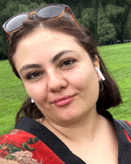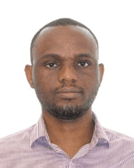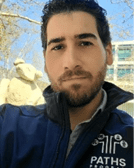For Immediate Release: Tuesday, October 14, 2025, 11:00 a.m. U.S. Eastern Time
Media Contact: Evelyn Mantegani, 202-725-2730, press@ashg.org
The American Society of Human Genetics (ASHG) congratulates and welcomes the 2025-2027 Human Genetics Scholars. This is an outstanding group of trainees and early career researchers who are recognized for their research accomplishments and commitment to achieving ASHG’s vision that people everywhere realize the benefits of human genetics and genomics research.
The Human Genetics Scholars Initiative is supported by the Society and our sponsors Biogen and Merck & Co. Our four new scholars join a vibrant community that offers mentorship, professional development, and the opportunity to engage with leaders across the human genetics and genomics field.
Meet the 2025-2027 Human Genetic Scholars:
Carmina Barberena-Jonas, MSc, Cinvestav
 Carmina Barberena-Jonas, originally from Aguascalientes, is a passionate scientist whose work focuses on exploring biological, evolutionary, and medical questions through computational and statistical methods in population genetics. She has a B.Sc. in Genomic Sciences from Universidad Nacional Autónoma de México (UNAM) and is currently pursuing her PhD at Cinvestav, Mexico, under the mentorship of Prof. Andrés Moreno-Estrada. She is dedicated to science outreach and community engagement, working to make genomic knowledge accessible to underrepresented groups. Her efforts include developing MexVar, a public web application to share data from the Mexican Biobank, and leading workshops and training programs aimed at marginalized communities with limited access to genomic resources. Through fieldwork across Mexico and Latin America, she has also engaged directly with Indigenous communities, ensuring ethical communication, informed consent, and the return of results in culturally respectful ways.
Carmina Barberena-Jonas, originally from Aguascalientes, is a passionate scientist whose work focuses on exploring biological, evolutionary, and medical questions through computational and statistical methods in population genetics. She has a B.Sc. in Genomic Sciences from Universidad Nacional Autónoma de México (UNAM) and is currently pursuing her PhD at Cinvestav, Mexico, under the mentorship of Prof. Andrés Moreno-Estrada. She is dedicated to science outreach and community engagement, working to make genomic knowledge accessible to underrepresented groups. Her efforts include developing MexVar, a public web application to share data from the Mexican Biobank, and leading workshops and training programs aimed at marginalized communities with limited access to genomic resources. Through fieldwork across Mexico and Latin America, she has also engaged directly with Indigenous communities, ensuring ethical communication, informed consent, and the return of results in culturally respectful ways.
Cal Liao, PhD, The Broad Institute of MIT and Harvard
 Cal Liao is a postdoctoral researcher at the Broad Institute and Massachusetts General Hospital, specializing in statistical genetics and psychiatric genomics. His research focuses on understanding genetic convergence across schizophrenia and bipolar disorder, integrating rare variant, polygenic, and transcriptomic analyses across diverse global populations. Cal is currently leading large-scale efforts in the Bipolar Exome (BipEx) Consortium, with ongoing collaborations across Australia, Asia, Africa, and South America. Cal earned his PhD from McGill University, where he led consortia-based studies of neurological and psychiatric disorders. A committed advocate for inclusive research, Cal is working to advance representation of underrepresented populations in genetic studies and to promote equitable approaches in precision psychiatry.
Cal Liao is a postdoctoral researcher at the Broad Institute and Massachusetts General Hospital, specializing in statistical genetics and psychiatric genomics. His research focuses on understanding genetic convergence across schizophrenia and bipolar disorder, integrating rare variant, polygenic, and transcriptomic analyses across diverse global populations. Cal is currently leading large-scale efforts in the Bipolar Exome (BipEx) Consortium, with ongoing collaborations across Australia, Asia, Africa, and South America. Cal earned his PhD from McGill University, where he led consortia-based studies of neurological and psychiatric disorders. A committed advocate for inclusive research, Cal is working to advance representation of underrepresented populations in genetic studies and to promote equitable approaches in precision psychiatry.
Oyesola Ojewunmi, PhD, Queen Mary University of London
 Oyesola Ojewunmi obtained a PhD in biochemistry from the University of Lagos, Nigeria, and is currently a Senior Research Fellow in Genomics at the Precision Healthcare University Research Institute, Queen Mary University of London, UK. His research applies advanced statistical methods to address genetic heterogeneity in genome-wide association meta-analyses and fine-mapping, with a focus on chronic kidney disease in people of African ancestry. He also works on sickle cell disease (SCD), investigating genotype-phenotype correlations by integrating multi-omics datasets to uncover biologically and clinically relevant markers and pathways. Having witnessed the profound impact of SCD on families and communities, Oyesola is deeply motivated to contribute to this field. In his previous postdoctoral position at King’s College London, UK, he led the first genome-wide association study of foetal haemoglobin in Nigerian patients with SCD. He is passionate about enhancing the capacity of young African scientists in genomics.
Oyesola Ojewunmi obtained a PhD in biochemistry from the University of Lagos, Nigeria, and is currently a Senior Research Fellow in Genomics at the Precision Healthcare University Research Institute, Queen Mary University of London, UK. His research applies advanced statistical methods to address genetic heterogeneity in genome-wide association meta-analyses and fine-mapping, with a focus on chronic kidney disease in people of African ancestry. He also works on sickle cell disease (SCD), investigating genotype-phenotype correlations by integrating multi-omics datasets to uncover biologically and clinically relevant markers and pathways. Having witnessed the profound impact of SCD on families and communities, Oyesola is deeply motivated to contribute to this field. In his previous postdoctoral position at King’s College London, UK, he led the first genome-wide association study of foetal haemoglobin in Nigerian patients with SCD. He is passionate about enhancing the capacity of young African scientists in genomics.
Wilfredo Gabriel Gonzalez Rivera, PhD candidate, University of California, San Diego
 Wilfredo is a first-generation, low-income PhD candidate from Vega Baja, Puerto Rico, in the Biomedical Informatics program at University of California, San Diego. He earned two bachelor’s degrees in computer science and biotechnology from the University of Puerto Rico at Mayagüez. His research combines genetics, genomics, and social science to understand the underlying source of health disparities, especially among admixed individuals in genetic studies. As a Puerto Rican, he’s committed to improving how we study complex traits in admixed populations, often mischaracterized by oversimplified population descriptors, which have complicated their analysis in genetic studies. His goal is to improve the clinical utility of genetics in admixed populations, leading to a more inclusive, accurate, and impactful healthcare for all. Wilfredo is a leader in the Biomedical Informatics field, having won prestigious awards such as the Sloan fellowship, the ARCS fellowship, the NIH-T15 fellowship, and recognized as UCSD’s Biomedical Informatics Trainee of the Year in 2024.
Wilfredo is a first-generation, low-income PhD candidate from Vega Baja, Puerto Rico, in the Biomedical Informatics program at University of California, San Diego. He earned two bachelor’s degrees in computer science and biotechnology from the University of Puerto Rico at Mayagüez. His research combines genetics, genomics, and social science to understand the underlying source of health disparities, especially among admixed individuals in genetic studies. As a Puerto Rican, he’s committed to improving how we study complex traits in admixed populations, often mischaracterized by oversimplified population descriptors, which have complicated their analysis in genetic studies. His goal is to improve the clinical utility of genetics in admixed populations, leading to a more inclusive, accurate, and impactful healthcare for all. Wilfredo is a leader in the Biomedical Informatics field, having won prestigious awards such as the Sloan fellowship, the ARCS fellowship, the NIH-T15 fellowship, and recognized as UCSD’s Biomedical Informatics Trainee of the Year in 2024.
* * *
About the American Society of Human Genetics (ASHG)
The American Society of Human Genetics (ASHG) is the leading global organization advancing the science of human genetics and genomics. Representing nearly 8,000 researchers, clinicians, genetic counselors, educators, and other professionals, ASHG drives progress in understanding the human genome and its role in health and disease. The Society fosters innovation and collaboration through its flagship events and publications—including the ASHG Annual Meeting and its peer-reviewed journals The American Journal of Human Genetics and Human Genetics and Genomics Advances. ASHG also champions science advocacy, supports the next generation of genetics professionals, and promotes responsible policies and public engagement in genetics. Learn more at www.ashg.org.
6120 Executive Blvd, Suite 500 | Rockville, MD 20852 | 301.634.7300 | society@ashg.org | www.ashg.org
Connect with ASHG on Twitter (@GeneticsSociety) | Facebook | LinkedIn
